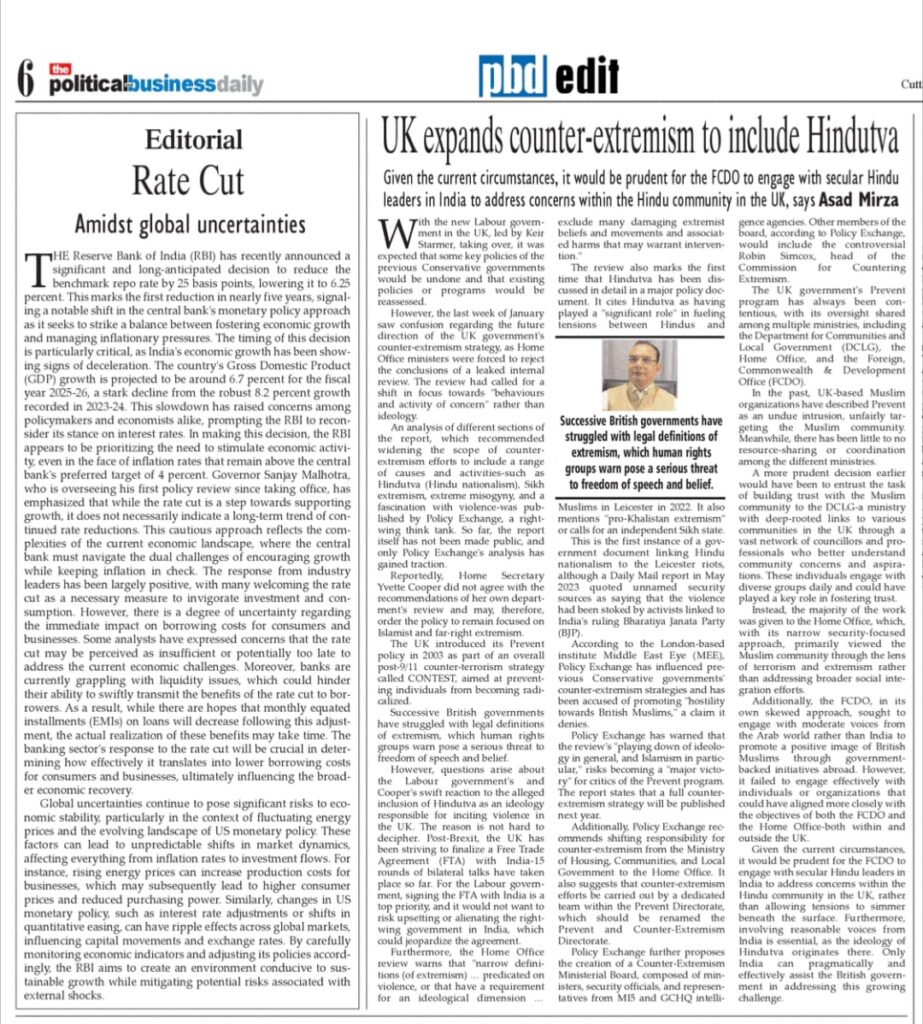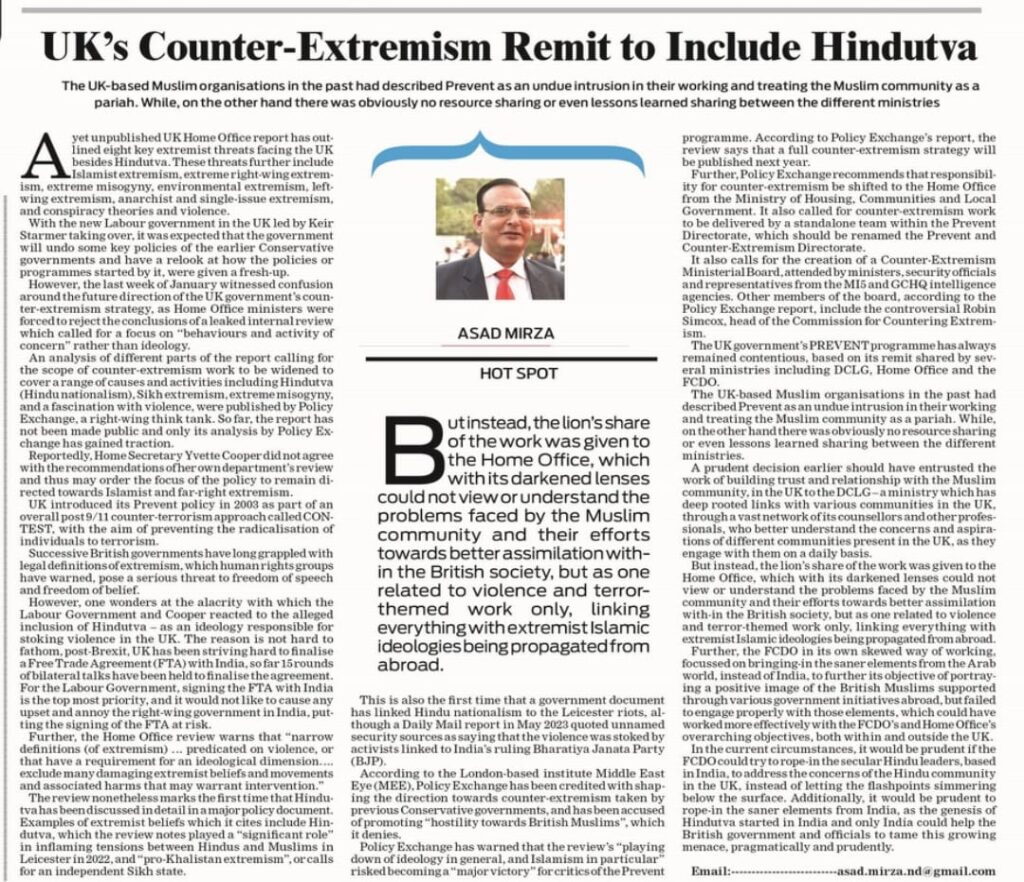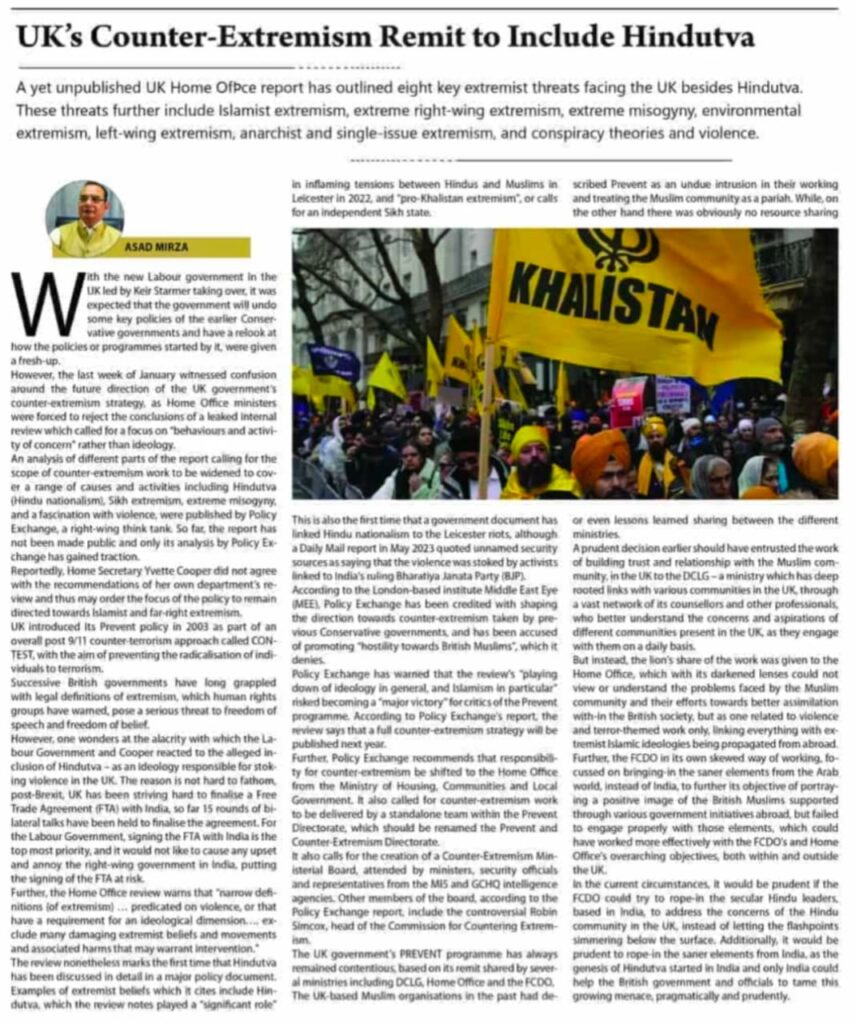51 total views, 1 views today



- https://www.punjabtodaynews.com/hindutva-in-uks-counter-extremism-review/
- https://nagalandpost.com/index.php/2025/02/15/uks-counter-extremism-remit-to-include-hindutva/
- https://muslimmirror.com/uk-expands-counter-extremism-focus-to-include-hindutva/
- https://clarionindia.net/uk-widens-counter-extremism-focus-to-include-hindutva/
- https://www.punjabtodaynews.com/hindutva-in-uks-counter-extremism-review/
- https://www.newageislam.com/war-terror/asad-mirza-new-age-islam/uks-counter-extremism-remit-include-hindutva/d/134571
UK’s Counter-Extremism Remit to Include Hindutva
 By Asad Mirza,
By Asad Mirza,
10 Feb 20205
A yet unpublished UK Home Office report has outlined eight key extremist threats facing the UK besides Hindutva. These threats further include Islamist extremism, extreme right-wing extremism, extreme misogyny, environmental extremism, left-wing extremism, anarchist and single-issue extremism, and conspiracy theories and violence.
With the new Labour government in the UK led by Keir Starmer taking over, it was expected that the government will undo some key policies of the earlier Conservative governments and have a relook at how the policies or programmes started by it, were given a fresh-up.
However, the last week of January witnessed confusion around the future direction of the UK government’s counter-extremism strategy, as Home Office ministers were forced to reject the conclusions of a leaked internal review which called for a focus on “behaviours and activity of concern” rather than ideology.
An analysis of different parts of the report calling for the scope of counter-extremism work to be widened to cover a range of causes and activities including Hindutva (Hindu nationalism), Sikh extremism, extreme misogyny, and a fascination with violence, were published by Policy Exchange, a right-wing think tank. So far, the report has not been made public and only its analysis by Policy Exchange has gained traction.
Reportedly, Home Secretary Yvette Cooper did not agree with the recommendations of her own department’s review and thus may order the focus of the policy to remain directed towards Islamist and far-right extremism.
UK introduced its Prevent policy in 2003 as part of an overall post 9/11 counter-terrorism approach called CONTEST, with the aim of preventing the radicalisation of individuals to terrorism.
Successive British governments have long grappled with legal definitions of extremism, which human rights groups have warned, pose a serious threat to freedom of speech and freedom of belief.
However, one wonders at the alacrity with which the Labour Government and Cooper reacted to the alleged inclusion of Hindutva – as an ideology responsible for stoking violence in the UK. The reason is not hard to fathom, post-Brexit, UK has been striving hard to finalise a Free Trade Agreement (FTA) with India, so far 15 rounds of bilateral talks have been held to finalise the agreement. For the Labour Government, signing the FTA with India is the top most priority, and it would not like to cause any upset and annoy the right-wing government in India, putting the signing of the FTA at risk.
Further, the Home Office review warns that “narrow definitions (of extremism) … predicated on violence, or that have a requirement for an ideological dimension…. exclude many damaging extremist beliefs and movements and associated harms that may warrant intervention.”
The review nonetheless marks the first time that Hindutva has been discussed in detail in a major policy document. Examples of extremist beliefs which it cites include Hindutva, which the review notes played a “significant role” in inflaming tensions between Hindus and Muslims in Leicester in 2022, and “pro-Khalistan extremism”, or calls for an independent Sikh state.
This is also the first time that a government document has linked Hindu nationalism to the Leicester riots, although a Daily Mail report in May 2023 quoted unnamed security sources as saying that the violence was stoked by activists linked to India’s ruling Bharatiya Janata Party (BJP).
According to the London-based institute Middle East Eye (MEE), Policy Exchange has been credited with shaping the direction towards counter-extremism taken by previous Conservative governments, and has been accused of promoting “hostility towards British Muslims”, which it denies.
Policy Exchange has warned that the review’s “playing down of ideology in general, and Islamism in particular” risked becoming a “major victory” for critics of the Prevent programme. According to Policy Exchange’s report, the review says that a full counter-extremism strategy will be published next year.
Further, Policy Exchange recommends that responsibility for counter-extremism be shifted to the Home Office from the Ministry of Housing, Communities and Local Government. It also called for counter-extremism work to be delivered by a standalone team within the Prevent Directorate, which should be renamed the Prevent and Counter-Extremism Directorate.
It also calls for the creation of a Counter-Extremism Ministerial Board, attended by ministers, security officials and representatives from the MI5 and GCHQ intelligence agencies. Other members of the board, according to the Policy Exchange report, include the controversial Robin Simcox, head of the Commission for Countering Extremism.
The UK government’s PREVENT programme has always remained contentious, based on its remit shared by several ministries including DCLG, Home Office and the FCDO.
The UK-based Muslim organisations in the past had described Prevent as an undue intrusion in their working and treating the Muslim community as a pariah. While, on the other hand there was obviously no resource sharing or even lessons learned sharing between the different ministries.
A prudent decision earlier should have entrusted the work of building trust and relationship with the Muslim community, in the UK to the DCLG – a ministry which has deep rooted links with various communities in the UK, through a vast network of its counsellors and other professionals, who better understand the concerns and aspirations of different communities present in the UK, as they engage with them on a daily basis.
But instead, the lion’s share of the work was given to the Home Office, which with its darkened lenses could not view or understand the problems faced by the Muslim community and their efforts towards better assimilation with-in the British society, but as one related to violence and terror-themed work only, linking everything with extremist Islamic ideologies being propagated from abroad.
Further, the FCDO in its own skewed way of working, focussed on bringing-in the saner elements from the Arab world, instead of India, to further its objective of portraying a positive image of the British Muslims supported through various government initiatives abroad, but failed to engage properly with those elements, which could have worked more effectively with the FCDO’s and Home Office’s overarching objectives, both within and outside the UK.
In the current circumstances, it would be prudent if the FCDO could try to rope-in the secular Hindu leaders, based in India, to address the concerns of the Hindu community in the UK, instead of letting the flashpoints simmering below the surface. Additionally, it would be prudent to rope-in the saner elements from India, as the genesis of Hindutva started in India and only India could help the British government and officials to tame this growing menace, pragmatically and prudently.
